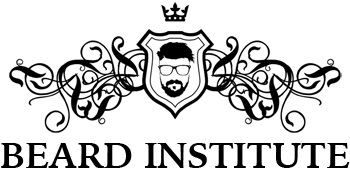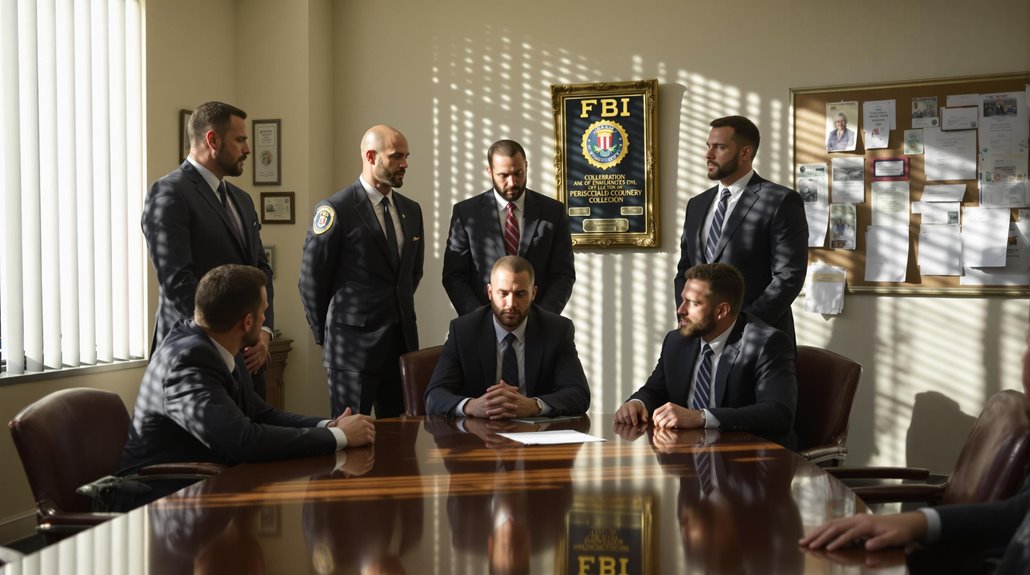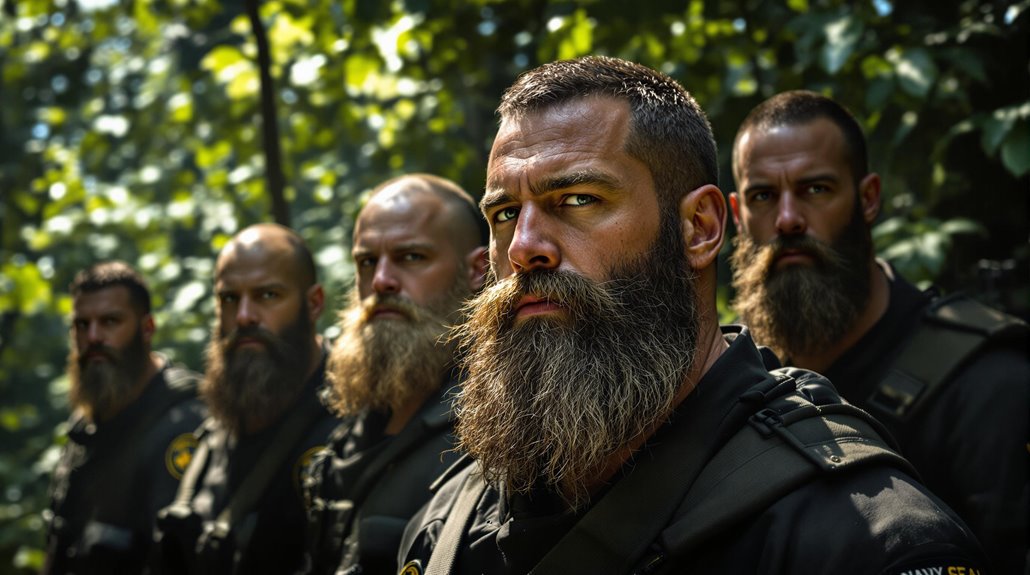What Jobs Don't Allow Beards?

Jobs in healthcare, food service, the military, and emergency services often don't allow beards due to critical safety and hygiene standards. Healthcare workers must maintain sterility, necessitating clean-shaven faces for proper mask fit. In food service, beards can contaminate food, leading to strict grooming rules. Military and law enforcement ban beards since facial hair might hinder the seal of protective masks. Firefighters and aviation professionals face similar restrictions for respirator fit. Corporate roles, especially in finance and law, may discourage facial hair for professional appearance. There are still more intricate details about these grooming standards to uncover.
Healthcare and Sterility
In healthcare settings, maintaining sterility is fundamental for patient safety, leading to strict grooming policies that often prohibit long beards. As a healthcare worker, you need to understand why these rules are in place. Facial hair can interfere with the proper fit of masks and personal protective equipment (PPE), which must be worn securely to be effective. If there's a gap, pathogens could easily find a way through, putting both you and the patients at risk.
Staying clean shaven or keeping your beard neatly trimmed is a significant part of adhering to these guidelines. Long beards can obstruct the seal of respirators and masks, especially during critical procedures, compromising the sterile environment that's crucial in operating rooms and patient care areas. Hospitals and clinics take these measures seriously, regularly monitoring grooming standards to guarantee compliance.
Non-compliance with these policies can lead to disciplinary actions, reflecting the industry's commitment to infection control. By adhering to these grooming standards, you're playing an important role in maintaining the hygiene and safety of the healthcare environment. It's all about minimizing contamination risks and safeguarding the health and safety of everyone involved.
Food Service Hygiene
As you move from healthcare to the food service sector, maintaining hygiene remains a top priority, but the focus shifts to preventing food contamination. In this industry, strict hygiene standards are enforced to guarantee that employees keep food safe for consumers. To comply, you may need to be clean-shaven or wear a properly fitted beard net. This requirement is vital because long beards can pose a risk of hair falling into food, potentially leading to contamination.
Many establishments mandate that beards be neatly trimmed or completely shaven when handling food. The Centers for Disease Control and Prevention (CDC) strongly recommends a clean-shaven appearance to verify that masks and hair restraints fit correctly. This practice minimizes the risk of foodborne illnesses and maintains public health.
Compliance with food safety protocols is significant. You'll likely undergo regular training on hygiene practices, emphasizing the importance of grooming policies. These sessions help you understand why adhering to grooming standards is fundamental in preventing food contamination. By following these protocols, you contribute to a safer and healthier dining experience for everyone, making sure that your establishment meets both legal and customer expectations.
Military Grooming Standards
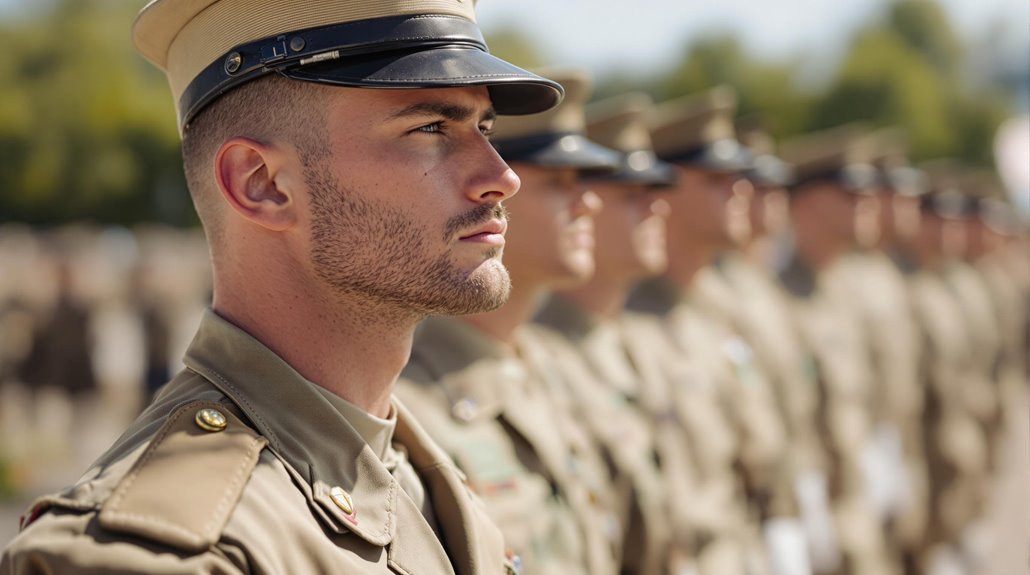
In relation to military grooming standards, maintaining a clean-shaven appearance isn't just about aesthetics—it's a critical aspect of safety and preparedness. The military requires personnel to be clean-shaven to guarantee gas masks and other protective equipment fit correctly during missions. This requirement is vital for safety, as even small facial hair can compromise the seal of a mask, potentially putting lives at risk in hazardous environments.
Different branches, like the Navy and Marine Corps, enforce similar military grooming standards. These standards prohibit beards due to safety concerns, guaranteeing all personnel are ready for any situation. Mustaches are allowed but must be neatly trimmed and not extend beyond the corners of the mouth. This balance allows some personal expression while maintaining safety and uniformity.
Medical exemptions are possible if shaving adversely affects your health, but these exceptions are rare. The overarching goal is to uphold discipline, professionalism, and readiness for duty. By adhering to these standards, the military guarantees that each member presents a unified, professional appearance, ready to face the challenges of their role. So, if you're considering a military career, be prepared for a clean-cut look.
Law Enforcement Uniformity
Law enforcement agencies often crack down on facial hair to guarantee all officers present a unified and professional appearance. If you're contemplating a career in law enforcement, be prepared to adhere to strict grooming standards that typically don't allow full beards. The terms of usage regarding facial hair are designed to guarantee that every officer projects discipline, authority, and a commitment to safety protocols—an vital part of the serious nature of this profession.
Full beards are often prohibited because they can compromise the seal of protective equipment, such as gas masks, which are fundamental in emergency situations. These masks need a tight seal to function effectively, and facial hair can disrupt this, putting both the officer and the public at risk. That's why, in many cases, officers may be allowed to have neatly trimmed mustaches, but full beards are generally off-limits.
While some variations may exist for undercover personnel, standard uniformed officers face stringent rules. These rules are in place to maintain uniformity and guarantee each officer can perform their duties safely and effectively. So, if facial hair is significant to you, you'll need to take these terms into account before joining the force.
Firefighter Safety Protocols
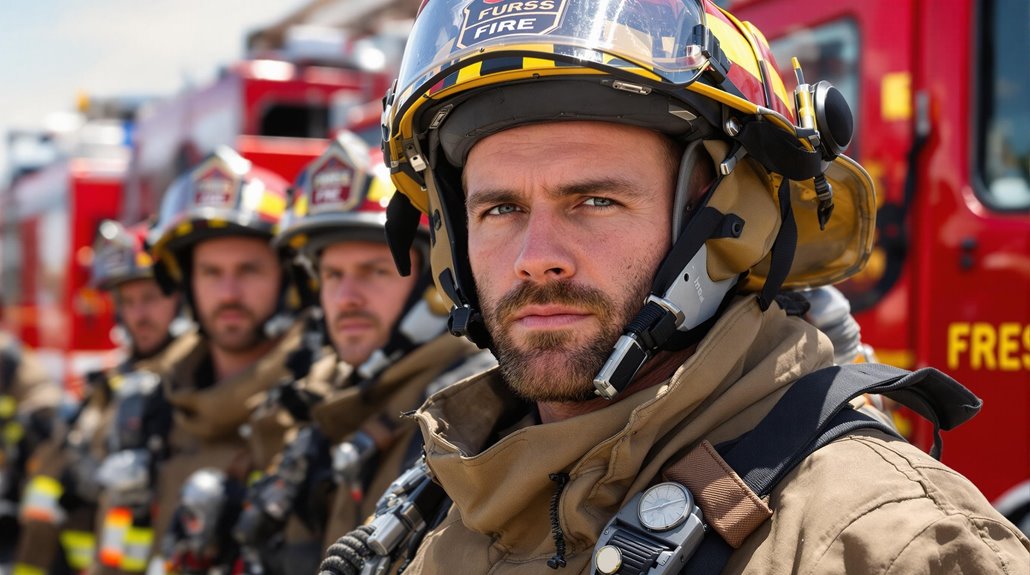
While law enforcement officers focus on maintaining uniformity with their grooming standards, firefighters prioritize safety through similar protocols. Firefighter safety protocols are imperative because they protect you in hazardous environments. A clean-shaven face is fundamental for guaranteeing a proper seal on your breathing apparatus mask. When battling fires, the last thing you want is for smoke or toxic gases to seep in due to a compromised air pack. Facial hair, particularly beards, can disrupt this significant seal, putting your respiratory safety at risk.
The National Fire Protection Association (NFPA) highlights the importance of grooming standards, specifically prohibiting any facial hair that interferes with the seal of respiratory protection equipment. This isn't just a suggestion; it's a critical safety measure. Fire departments enforce these grooming policies strictly to guarantee that you and your team can respond effectively and safely in emergency situations. While some departments might allow neatly trimmed mustaches, full beards are generally off-limits. This is due to safety regulations and the need for equipment compatibility, which can't be overstated. By adhering to these protocols, you're not only protecting yourself but also guaranteeing that you can perform your duties effectively when it matters most.
Chemical Industry Regulations
Why are beards banned in the chemical industry? It's all about safety. Chemical industry regulations require that employees handling hazardous materials maintain a clean-shaven face to guarantee respirators and personal protective equipment (PPE) function effectively. When you're dealing with dangerous substances, like hydrofluoric acid, even the smallest gap in a respirator's seal can lead to contamination and serious health risks.
Imagine being in a high-stakes environment where every second counts. Your clean-shaven face could be the difference between safety and disaster. Here's why strict grooming standards matter:
- Your Life Depends on It: A secure respirator seal is vital in emergencies.
- Protect Your Colleagues: One compromised seal can endanger everyone around you.
- Environmental Safety: Preventing contamination protects both the workplace and surrounding areas.
- Compliance is Non-Negotiable: OSHA guidelines mandate it for your protection.
- Peace of Mind: Knowing you're following chemical industry regulations helps you focus on the task at hand.
Aviation and Respirator Fit
In the aviation industry, maintaining a clean-shaven face is vital due to the necessity of a proper seal on oxygen masks. When you're a pilot, safety is paramount, and that means guaranteeing that your oxygen mask fits securely. Facial hair can interfere with this significant seal, compromising your safety during emergency situations where oxygen masks are necessary. A proper seal guarantees that the mask delivers the oxygen you need without leaks, which is critical during flights at high altitudes.
Respirators, similar to the oxygen masks used in aviation, also require a secure fit to be effective. If you're working in any field that involves respirators, such as chemical spill response, the presence of facial hair can disrupt the seal between the mask and your skin. This disruption can lead to dangerous situations where harmful substances are inhaled, as the respirator can't function properly without a tight seal.
Safety regulations across industries, including aviation and emergency services, strictly enforce no-facial-hair policies. By adhering to these grooming policies, you guarantee that both oxygen masks and respirators function as intended, keeping you safe in potentially hazardous environments.
Offshore Drilling Requirements
Offshore drilling platforms are environments where safety is non-negotiable, and being clean-shaven is an important part of that safety equation. As an offshore worker, you must maintain a clean-shaven face to guarantee a proper seal on respirators. This isn't just a preference—it's essential for your safety in hazardous conditions. The presence of facial hair can compromise breathing apparatus effectiveness, putting you and others at risk during emergencies on the rig. Adhering to these grooming standards isn't optional; it's a requirement dictated by safety regulations.
Consider the impact of not complying:
- Your safety could be at risk during an emergency if your respirator doesn't fit properly.
- Colleagues' lives depend on your compliance with safety standards, as teamwork is critical on rigs.
- Equipment malfunction risks increase, leading to potentially catastrophic accidents.
- OSHA mandates clean-shaven faces for compliance with PPE requirements, making it a legal necessity.
- Your career in offshore drilling could be threatened if you fail to meet grooming policies.
In this field, maintaining clean-shaven faces isn't merely about appearance; it's an important safety measure to protect yourself and your team, guaranteeing everyone returns home safely.
Corporate Professionalism
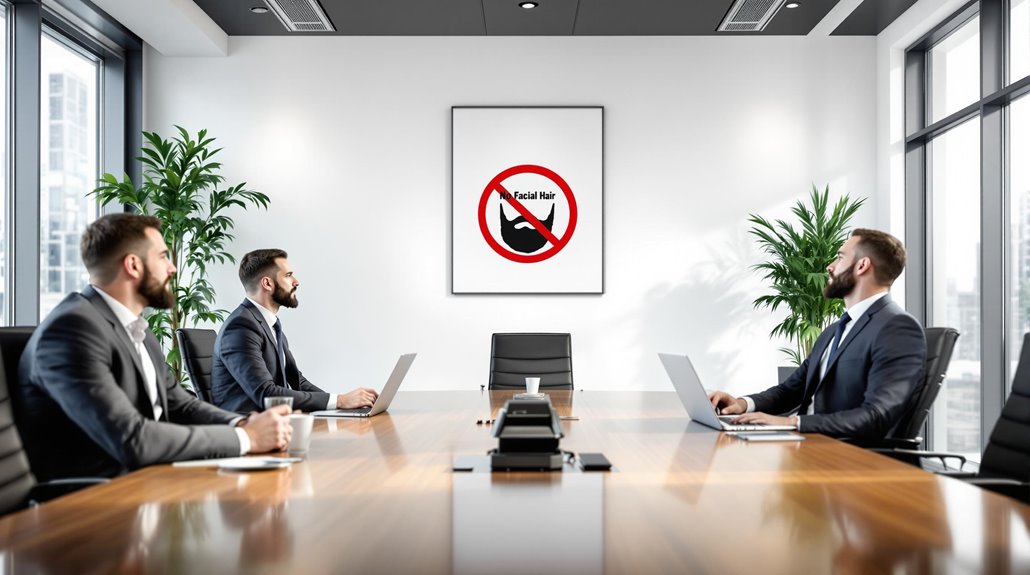
Corporate professionalism often demands a clean-shaven appearance, especially in client-facing roles like finance and sales. In these environments, you're expected to maintain a polished look, as it aligns with the industry's standards of uniformity and discipline. Many companies enforce strict grooming policies, requiring you to be clean-shaven to guarantee you project a professional image. Research shows that 80% of hiring managers view a clean-shaven look as more professional and trustworthy during preliminary interviews, setting the tone for corporate expectations.
In high-stakes sectors such as law and consulting, initial impressions are vital. Here, being clean-shaven is part of your professional branding. Organizations may have unwritten rules that discourage facial hair, as beards can sometimes detract from a professional image or authority, particularly in upper management positions. This perception reinforces the significance of a clean-shaven style to maintain corporate professionalism.
If you're entering the financial services industry, expect a clean-shaven mandate. This field prioritizes traditional corporate values, and a uniform appearance reflects discipline and reliability. While trends evolve, the clean-shaven look remains a steadfast requirement in many corporate settings where professionalism is of utmost importance.
Cultural and Historical Influences
Throughout history, clean-shaven faces have often symbolized professionalism and authority, particularly in sectors like the military and law enforcement. Strict grooming standards are imposed in these fields for safety and uniformity. The U.S. military, for instance, has long maintained policies favoring clean-shaven appearances to guarantee gas masks and protective equipment fit properly, a practice rooted in safety regulations dating back decades. Meanwhile, in professional contexts like finance and upper management, societal perceptions link a clean-shaven look with trustworthiness.
Despite cultural shifts gradually embracing facial hair in some industries, traditional sectors like emergency services and food handling still impose no-beard policies due to hygiene and safety concerns. These rules reflect broader cultural shifts but also highlight resistance to change in certain professions. You might feel:
- Frustration when a job denies your personal grooming preferences.
- Pride in adapting to longstanding traditions.
- Disappointment over missed opportunities because of grooming standards.
- Curiosity about how these rules evolved over time.
- Hope for more inclusive grooming standards in the future.
Understanding these influences can help you navigate the professional world and make informed decisions about your career path.
